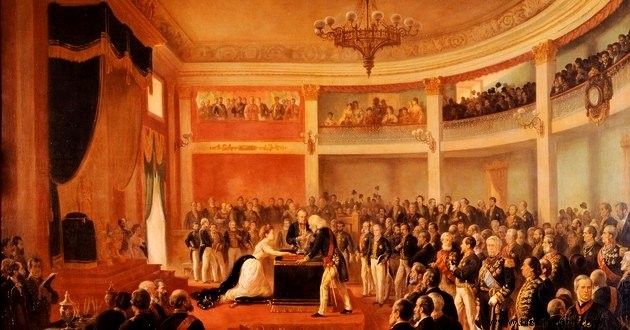ThePrincess Isabel , Isabel de Bragança or Isabel do Brasil, was one of the most important female figures in the country's history.
She was the first woman to administer Brazil, being Regent of the Empire and the last Imperial Princess of the country.
She assumed the throne three times, on account of the trips made by Dom Pedro II. In her last regency, she signed the Lei Áurea that extinguished slavery in Brazil.
Biography
Isabel Cristina Leopoldina Augusta Micaela Gabriela Rafaela Gonzaga of Bourbon and Bragança, was born in São Cristóvão Palace in Rio de Janeiro, on July 29, 1846.
Isabel was the first daughter of the Emperor of Brazil, Dom Pedro II, and of the Empress Dona Teresa Cristina of Bourbon-Two Sicilies. The couple's second daughter, Princess Leopoldina (1847-1871) was her companion for life. She even had two brothers who died in infancy.

As is to be expected, she had a painstaking education at Court, guided by several masters, which broadened her general knowledge and studies of foreign languages.
In 1860, with only 14 years old as stipulated in the country's Constitution, she took the oath as heir to the throne which stated:
See also:Second ReignMarriage
In 1864, she married the French prince Dom Luís Filipe Maria Fernando Gastão de Orléans who would become better known as Gastão de Orléans, the Count d'Eu. In turn, her sister Princess Leopoldina married his cousin, Louis Auguste Maria Eudes of Saxe-Coburg and Gotha, Duke of Saxe.
The marriage produced three children:the princes D. Pedro de Alcântara, D. Luís Maria Filipe and D. Antônio Gastão Francisco.
Princess Isabel traveled with her husband to European courts and was received in Portugal, Spain, France and the United Kingdom. Likewise, she visited several Brazilian capitals and cities.
In Brazil, she actively participated in the abolitionist cause, freed the slaves in her service on her wedding day and was always inclined to education issues .
See also:AbolitionismExile
With the republican coup and the institution of the republic, the Imperial Family is expelled from the country on November 18, 1888. Dona Isabel starts to live with her family in France, in the castle d'Eu.
She died in France, on November 14, 1921, without ever having returned to Brazil.
Abolition of Slavery

Princess Isabel was actively involved in the process of abolition of slavery in Brazil. She allied herself with popular abolitionist movements, received figures from the movement such as André Rebouças and always had a bunch of camellias on her desk, a symbol of abolitionism.
She signed the laws that granted the liberation of slaves as the Free Womb Law (nº 2040), signed by the Princess on September 28, 1871, where she instituted freedom for the children of slaves who were born from that date onwards.
The Golden Law (nº 3.353), signed on May 13, 1888, extinguished slave labor in the country, which lasted 300 years. According to the document:
With this law, she became known as “Redeemer of Slaves”, but won the enmity of the elite in general. Among other things, Princess Isabel was a strong supporter of agrarian reform and women's suffrage.
See also:Abolition of Slavery in BrazilCuriosities
- At the age of 25, Princess Isabel was elected the country's first Senator (1871), according to the Brazilian Constitution of 1824. In addition, she was the third Brazilian head of state and head of government after her grandmother, Empress Leopoldina and his great-great-grandmother, Queen Maria I.
- After getting married, Princess Isabel's full name was:Isabel Cristina Leopoldina Augusta Micaela Gabriela Rafaela Gonzaga de Bragança and Bourbon d'Orléans.
- May 13 is the date on which the “Abolition of Slavery” is commemorated, the date on which Isabel do Brasil signed the “Golden Law”, ending slavery in the country.
- The name “Áurea” symbolizes gold and, therefore, was chosen to represent the Law that would end slave labor in Brazil.
- Her remains lie next to her husband, Conde D'Eu, in the Mausoleum of the Petrópolis Cathedral, in Rio de Janeiro.
Read more :
- Dom Pedro II
- Monarchy
- Black Brazilian Personalities
- Women Who Made the History of Brazil
- Origin of Black Awareness Day
